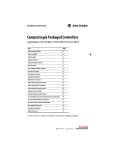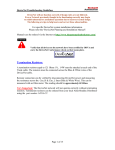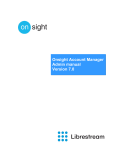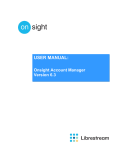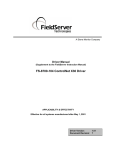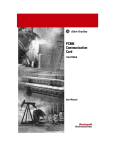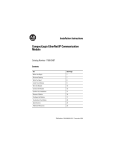Download Compatible Systems DES I/O Card 10/100 Installation guide
Transcript
Installation Instructions FLEX I/O EtherNet/IP Adapters Important User Information Identifies information about practices or ATTENTION circumstances that can lead to personal injury or death, property damage, or economic loss. Attentions help you identify a hazard, avoid a hazard, and recognize the consequence Cat. No. 1794-AENT, Series B SHOCK HAZARD Labels may be on or inside the equipment (for example, drive or motor) to alert people that dangerous voltage may be present. Important User Information Solid state equipment has operational characteristics differing from those of electromechanical equipment. Safety Guidelines for the Application, Installation and Maintenance of Solid State Controls (Publication SGI-1.1 available from your local Rockwell Automation sales office or online at http://literature.rockwellautomation.com) describes some important differences between solid state equipment and hard-wired electromechanical devices. Because of this difference, and also because of the wide variety of uses for solid state equipment, all persons responsible for applying this equipment must satisfy themselves that each intended application of this equipment is acceptable. In no event will Rockwell Automation, Inc. be responsible or liable for indirect or consequential damages resulting from the use or application of this equipment. The examples and diagrams in this manual are included solely for illustrative purposes. Because of the many variables and requirements associated with any particular installation, Rockwell Automation, Inc. cannot assume responsibility or liability for actual use based on the examples and diagrams. No patent liability is assumed by Rockwell Automation, Inc. with respect to use of information, circuits, equipment, or software described in this manual. Reproduction of the contents of this manual, in whole or in part, without written permission of Rockwell Automation, Inc., is prohibited. Throughout this manual we use notes to make you aware of safety considerations. Identifies information about practices or WARNING circumstances that can cause an explosion in a hazardous environment, which may lead to personal injury or death, property damage, or economic loss. IMPORTANT Identifies information that is critical for successful application and understanding of the product. BURN HAZARD ATTENTION Labels may be on or inside the equipment (for example, drive or motor) to alert people that surfaces may reach dangerous temperatures. Environment and Enclosure This equipment is intended for use in a Pollution Degree 2 industrial environment, in overvoltage Category II applications (as defined in IEC publication 60664-1), at altitudes up to 2000 m (6562 ft) without derating. This equipment is considered Group 1, Class A industrial equipment according to IEC/CISPR Publication 11. Without appropriate precautions, there may be potential difficulties ensuring electromagnetic compatibility in other environments due to conducted as well as radiated disturbance. This equipment is supplied as open-type equipment. It must be mounted within an enclosure that is suitably designed for those specific environmental conditions that will be present and appropriately designed to prevent personal injury resulting from accessibility to live parts. The enclosure must have suitable flame-retardant properties to prevent or minimize the spread of flame, complying with a flame spread rating of 5VA, V2, V1, V0 (or equivalent) if non-metallic. The interior of the enclosure must be accessible only by the use of a tool. Subsequent sections of this publication may contain additional information regarding specific enclosure type ratings that are required to comply with certain product safety certifications. Besides this publication, see: • Industrial Automation Wiring and Grounding Guidelines, for additional installation requirements, Allen-Bradley publication 1770-4.1. • NEMA Standards publication 250 and IEC publication 60529, as applicable, for explanations of the degrees of protection provided by different types of enclosure. 2 FLEX I/O EtherNet/IP Adapters WARNING WARNING WARNING ATTENTION ATTENTION Installation Instructions When you insert or remove the module while backplane power is on, an electrical arc can occur. This could cause an explosion in hazardous location installations. Be sure that power is removed or the area is nonhazardous before proceeding. If you connect or disconnect the communications cable with power applied to this module or any device on the network, an electrical arc can occur. This could cause an explosion in hazardous location installations. Be sure that power is removed or the area is nonhazardous before proceeding. If you connect or disconnect wiring while the field-side power is on, an electrical arc can occur. This could cause an explosion in hazardous location installations. Be sure that power is removed or the area is nonhazardous before proceeding. This product is grounded through the DIN rail to chassis ground. Use zinc-plated yellow-chromate steel DIN rail to assure proper grounding. The use of other DIN rail materials (such as aluminum or plastic) that can corrode, oxidize, or are poor conductors, can result in improper or intermittent grounding. Secure DIN rail to mounting surface approximately every 200 mm (7.8 in.) and use end-anchors appropriately. Prevent Electrostatic Discharge This equipment is sensitive to electrostatic discharge, which can cause internal damage and affect normal operation. Follow these guidelines when you handle this equipment: • Touch a grounded object to discharge potential static. • Wear an approved grounding wriststrap. • Do not touch connectors or pins on component boards. • Do not touch circuit components inside the equipment. • Use a static-safe workstation, if available. • Store the equipment in appropriate static-safe packaging when not in use. Publication 1794-IN082C-EN-P - October 2007 North American Hazardous Location Approval The following information applies when operating this equipment in hazardous locations. Products marked “CL I, DIV 2, GP A, B, C, D are suitable for use in Class I Division 2 Groups A, B, C, D, hazardous locations and nonhazardous locations only. Each product is supplied with markings on the rating nameplate indicating the hazardous location temperature code. When combining products within a system, the most adverse temperature code (lowest “T” number) may be used to help determine the overall temperature code of the system. Combinations of equipment in your system are subject to investigation by the local Authority Having Jurisdiction at the time of installation. WARNING EXPLOSION HAZARD • Do not disconnect equipment unless power has been removed or the area is known to be nonhazardous. • Do not disconnect connections to this equipment unless power has been removed or the area is known to be nonhazardous. Secure any external connections that mate to this equipment by using screws, sliding latches, threaded connectors, or other means provided with this product. • Substitution of components may impair suitability for Class I, Division 2. • If this product contains batteries, they must only be changed in an area known to be nonhazardous. Informations sur l’utilisation de cet équipement en environnements dangereux . Les produits marqués “CL I, DIV 2, GP A, B, C, D” ne conviennent qu’à une utilisation en environnements de Classe I Division 2 Groupes A, B, C, D dangereux et non dangereux. Chaque produit est livré avec des marquages sur sa plaque d’identification qui indiquent le code de température pour les environnements dangereux. Lorsque plusieurs produits sont combinés dans un système, le code de température le plus défavorable (code de température le plus faible) peut être utilisé pour déterminer le code de température global du système. Les combinaisons d’équipements dans le système sont sujettes à inspection par les autorités locales qualifiées au moment de l’installation. RISQUE AVERTISSEMENT D’EXPLOSION • Couper le courant ou s’assurer que l’environnement est classé non dangereux avant de débrancher l'équipement. • Couper le courant ou s'assurer que l’environnement est classé non dangereux avant de débrancher les connecteurs. Fixer tous les connecteurs externes reliés à cet équipement à l'aide de vis, loquets coulissants, connecteurs filetés ou autres moyens fournis avec ce produit. • La substitution de composants peut rendre cet équipement inadapté à une utilisation en environnement de Classe I, Division 2. • S’assurer que l’environnement est classé non dangereux avant de changer les piles. FLEX I/O EtherNet/IP Adapters 8 2 3 22 5. If necessary, push up on the locking tab to lock. 7 ++ 6 4 5 3 4. If the adapter does not lock in place, use a screwdriver or similar device to move the locking tab down while pressing the adapter flush onto the DIN rail: releasing the locking tab to lock the adapter in place. EtherNet/IP Adapter, Cat. No. 1794-AENT 1 Installation Instructions 6. Connect the adapter wiring as shown under Connecting Wiring later in this document. 9 Component Identification 1 EtherNet/IP adapter 2 Status indicators 3 MAC ID label 4 Network cable RJ45 connector (underside) 5 Adapter DIN rail locking tab 6 24V dc connections 7 24V common connections 8 Flexbus connector 9 IP address switches Mount or Replace the Adapter on an Existing System 1. Remove the Ethernet plug-in connector from the bottom of the adapter. 2. Disconnect any adapter wiring jumpered to the adjacent terminal base. 3. Disconnect any user power wiring connections to the adapter. Install Your Adapter Module A B 1794-AENT/B 22 ++ C Mount on a DIN Rail Before Installation of the Terminal Base Units 4. Using a screwdriver or similar tool, open the module locking mechanism and remove the module from the base unit to which the adapter will be attached. 5. Push the Flexbus connector toward the right side of the terminal base to unplug the backplane connection. Make certain the Flexbus connector is completely clear of the adapter. The slide must be completely to the right and the raised spot on the slide visible. ATTENTION 1. Hook the lip on the rear of the adapter (A) onto the top of the 35 x 7.5 mm DIN rail (B). Terminal base of I/O module adjacent to the 1794-AENT adapter. 2. Rotate the adapter module onto the rail. 3. Press the adapter down onto the DIN rail until flush. 22 ++ 31244CC DIN rail locking tab (C) will snap into position and lock the adapter to the DIN rail. Locking Tab C 6. Release the DIN rail locking tab (C) and remove the adapter. Publication 1794-IN082C-EN-P - October 2007 4 FLEX I/O EtherNet/IP Adapters Installation Instructions Before installing the new adapter, notice the notch on the right rear of the adapter. This notch accepts the hook on the terminal base unit. The notch is open at the bottom. The hook and adjacent connection point keep the terminal base and the adapter tight together, reducing the possibility of a break in communication over the backplane. 1. Connect the Ethernet network cable to the RJ45 connector (A) on the underside of the adapter. A 2 + + 2 + 31247-M IMPORTANT 7. Complete the adapter mounting as shown below. Push down and in at the same time to lock the adapter to the DIN rail. When the adapter is locked onto the DIN rail, gently push the Flexbus connector into the adapter to complete the backplane. We recommend connecting the module to the network via a 100 MB full-duplex switch, which will reduce network collisions and lost packets, and increase bandwidth. For detailed Ethernet connection information, see these publications: • Ethernet/IP Performance and Application Guide, publication ENET-AP001 • Ethernet/IP Media Planning and Installation Guide, publication number ENET-IN001 • Precautions to Increase the Noise Immunity of the 1794-AENT FLEX I/O Ethernet/IP Adapter System, KnowBase Technote ID 42604 22 ++ 31244-M 8. If the adapter does not lock in place, use a screwdriver or similar device to move the locking tab down while pressing the adapter flush onto the DIN rail: releasing the locking tab to lock the adapter in place. If necessary, push up on the locking tab to lock. 9. Reinstall the module in the adjacent terminal base unit. Connect Wiring WARNING If you connect or disconnect the communication cable with power applied to the adapter or any device on the network, an electrical arc can occur. This could cause an explosion in hazardous location installations. Be sure that power is removed or the area is nonhazardous before proceeding. D B 1794-AENT/B 31246-M A C E Publication 1794-IN082C-EN-P - October 2007 2. Connect 24V common to the left side of the upper connector, terminal B. IMPORTANT Do not wire more than 2 conductors on any single terminal. When connecting wiring, torque terminal screws B, C, D, and E to 0.8 Nm (7 lb-in). 3. Connect +24V dc input power to the left side of the lower connector, terminal C. 4. Use connectors D and E to pass 24V common (D) and 24V dc power (E) to the next module in the series. FLEX I/O EtherNet/IP Adapters Set the Network Address The adapter ships with the thumbwheel switches set to 999 and DHCP enabled. You can set the network Internet Protocol (IP) address in these ways: • Use the thumbwheel switches on the module. • Use a Dynamic Host Configuration Protocol (DHCP) server, such as Rockwell Automation BootP/DHCP. • Retrieve the IP address (if previously set) from nonvolatile memory. The adapter reads the thumbwheel switches first to determine if the switches are set to a valid number. You set the node address by using the three-position thumbwheel switch. Press the + or - buttons to change the number. Valid settings are 001…254. When the switches are set to a valid number, the adapter’s IP address is 192.168.1.xxx (where xxx represents the number set on the switches). The adapter’s subnet mask is 255.255.255.0 and the gateway address is set to 0.0.0.0. The adapter does not have a host name assigned, or use any Domain Name System when using the thumbwheel settings. Network Address Thumbwheel Installation Instructions 5 If you set the switches to an invalid number (such as 000, or a value greater than 254), the adapter checks to see if you enabled DHCP. DHCP Enabled and Not Enabled If DHCP is Then the adapter Enabled Asks for an address from a DHCP server. The DHCP server also assigns other Transport Control Protocol (TCP) parameters. Not enabled Uses the IP address (along with other TCP configurable parameters) stored in nonvolatile memory. The switch value of 888 lets you reset all configuration parameters to the factory settings. This is useful in situations where you want to reuse a module that has an unknown configuration. Refer to the EtherNet/IP Adapter User Manual, publication ENET-UM001, for more information. Indicators The faceplate of the 1794-AENT adapter is provided with three bicolor indicators. Module Status Network Status Network Address Thumbwheel Press Either the + or Buttons to Change the Number Link Status 22 ++ Publication 1794-IN082C-EN-P - October 2007 6 FLEX I/O EtherNet/IP Adapters Installation Instructions Module Status Indicators Indicator Module Status Indicator Status Off No Power Flashing Green Standby Green Operational Flashing Red - Minor Fault Red Major Fault Flashing Red and Green Self Test Description Adapter does not have 24V dc power. Make sure power is being supplied to the adapter. Adapter not configured. Configure adapter. Adapter operating correctly. No action required. A recoverable fault has been detected. This could be caused by an incorrect or inconsistent configuration. Check configuration and reconfibure as needed. An unrecoverable fault has been detected. Recycle power to the adapter. If this does not clear the fault, replace the adapter. Adapter performing power-up self test. Wait until completed. Network Status Indicators Indicator Network Status Indicator Status Description Off Adapter is not powered, or does not have Not Powered, an IP address. No IP • Verify there is power and the adapter Address is correctly wired to the power supply. • Make sure the adapter is configured. Adapter has obtained an IP address, but Flashing Green has no established connections. No Connections. Green Adapter has an IP address and at least one CIP established connection. Connections Flashing Red One or more of the connections in which the adapter is the target has timed out. Connection Timeout Red Adapter has detected that its IP address is Duplicate IP already in use. Configure the adapter with Address a unique IP address. Flashing Red Adapter performing power-up self test. and Green Self Test Specifications FLEX I/O EtherNet/IP Adapter - 1794-AENT Attribute Value I/O capacity 8 modules Power supply To comply with the CE Low Voltage Directive (LVD), this equipment must be powered from a source compliant with the following: Safety Extra Low Voltage (SELV) or Protected Extra Low Voltage (PELV). Input voltage rating 24V dc nom Input voltage range 19.2…31.2V dc (includes 5% ac ripple) Communication rate 10/100 Mbps Indicators Module Status - red/grn Network Status - red/grn Link Status - grn Flexbus output current 640 mA max Isolation voltage 50V continuous, Basic Insulation Type Tested at 1000V ac for 60 s, power to Flexbus to EtherNet Power consumption 550 mA max, 440 mA max at 24V dc Power dissipation 7.3 W max @ 19.2V dc Thermal dissipation 24.9 BTU/hr @ 19.2V dc Ethernet connector RJ45 Cat. 5 Enclosure type rating None (open-style) North American temp code Power conductors Wire size Status Off No link exists. Flashing Green I/O is being transmitted or received. Steady Green - A link exists. Description Verify network cabling. Correct as necessary. Normal operation. No action required. Publication 1794-IN082C-EN-P - October 2007 0.34…2.5 mm2 (22…12 AWG) stranded copper wire rated at 75 °C (167 °F) or higher, 1.2 mm (3/64 in.) insulation max Category(1) 1 - on power ports 2 - on communications ports Terminal screw torque 0.8 Nm (7 lb-in) Publications(2) User Manual ENET-UM001 (1) You use this category information for planning conductor routing as described in Allen-Bradley Industrial Automation Wiring and Grounding Guidelines, publication 1770-4.1. (2) For additional installation information, refer to ODVA EtherNet/IP Media Planning and Installation manual, publication 148 at http://www.odva.org, and document number 42604 in Rockwell Automation Knowledgebase at http://rockwellautomation.com/knowledgebase. Link Status Indicator Indicator Link Status Indicator T4A FLEX I/O EtherNet/IP Adapters Environmental Specifications Value Temperature, operating IEC 60068-2-1 (Test Ad, Operating Cold), IEC 60068-2-2 (Test Bd, Operating Dry Heat), IEC 60068-2-14 (Test Nb, Operating Thermal Shock): 0…55 °C (32…131 °F) Temperature, nonoperating IEC 60068-2-1 (Test Ab, Unpackaged Nonoperating Cold), IEC 60068-2-2 (Test Bb, Unpackaged Nonoperating Dry Heat), IEC 60068-2-14 (Test Na, Unpackaged Nonoperating Thermal Shock): –40…85 °C (–40…185 °F) Relative humidity IEC 60068-2-30 (Test Db, Unpackaged Nonoperating Damp Heat): 5…95% noncondensing Vibration IEC60068-2-6 (Test Fc, Operating): 5 g @ 10…500 Hz Value (when product is marked(1) c-UL-us UL Listed Industrial Control Equipment, certified for US and Canada (See UL file E65584) UL Listed for Class I, Division 2, Groups A, B, C and D Hazardous locations, certified for US and Canada (See UL file E194810) CE European Union 2004/108/EEC EMC Directive, compliant with: EN 61326; Meas./Control/Lab., Industrial Requirements EN 61000-6-2; Industrial Immunity EN 61000-6-4; Industrial Emissions EN61131-2; Programmable Controllers (Clause 8, Zone A & B) C-Tick Australian Radiocommunications Act compliant with AS/NZS CISPR 11, Industrial Emissions EtherNet/IP ODVA conformance tested to EtherNet/IP specifications Shock, operating IEC60068-2-27 (Test Ea, Unpackaged shock): 30 g (1) Shock, nonoperating IEC60068-2-27 (Test Ea, Unpackaged shock): 50 g Emissions CISPR 11: Group 1, Class A ESD immunity IEC 61000-4-2: 6 kV contact discharges 8 kV air discharges Radiated RF immunity IEC 61000-4-3: 10 V/m with 1 kHz sine-wave 80% AM from 80…2000 MHz 10 V/m with 200 Hz 50% Pulse 100% AM at 900 MHz 10 V/m with 200 Hz 50% Pulse 100% AM at 1890 MHz 3 V/m with 1 kHZ sine-wave 80% AM from 2000…2700MHz EFT/B immunity IEC 61000-4-4: ±4 kV at 5 kHz on power ports ±2 kV at 5 kHz on communication ports Surge transient immunity IEC 61000-4-5: ±1 kV line-line (DM) and ±2 kV line-earth (CM) on power ports ±2 kV line-earth (CM) on communication ports Conducted RF immunity IEC 61000-4-6: 10V rms with 1 kHz sine-wave 80% AM from 150 kHz…80 MHz 7 Certifications Certification Attribute Installation Instructions See the Product Certification link at http://www.ab.com for Declarations of Conformity, Certificates and other certification details. Mounting Dimensions B 50 (2.2) 87 (3.4) 80 (3.2) 30 (1.2) 94 (3.7) 1794-AENT 87H x 94W x 69D (3.4H x 3.7W x 2.7D) A = DIN rail. B = Secure DIN rail approximately every 200 mm (7.87 in.). A mm (in.) Flex I/O, Allen-Bradley, ControlLogix, Rockwell Automation, RSLogix 5000, and RSLinx are trademarks of Rockwell Automation, Inc. Trademarks not belonging to Rockwell Automation are property of their respective companies. Publication 1794-IN082C-EN-P - October 2007 Rockwell Automation Support Rockwell Automation provides technical information on the Web to assist you in using its products. At http://support.rockwellautomation.com, you can find technical manuals, a knowledge base of FAQs, technical and application notes, sample code and links to software service packs, and a MySupport feature that you can customize to make the best use of these tools. For an additional level of technical phone support for installation, configuration, and troubleshooting, we offer TechConnect support programs. For more information, contact your local distributor or Rockwell Automation representative, or visit http://support.rockwellautomation.com. Installation Assistance If you experience a problem within the first 24 hours of installation, please review the information that's contained in this manual. You can also contact a special Customer Support number for initial help in getting your product up and running. United States 1.440.646.3434 Monday – Friday, 8am – 5pm EST Outside United States Please contact your local Rockwell Automation representative for any technical support issues. New Product Satisfaction Return Rockwell Automation tests all of its products to ensure that they are fully operational when shipped from the manufacturing facility. However, if your product is not functioning and needs to be returned, follow these procedures. United States Contact your distributor. You must provide a Customer Support case number (see phone number above to obtain one) to your distributor in order to complete the return process. Outside United States Please contact your local Rockwell Automation representative for the return procedure. Publication 1794-IN082C-EN-P - October 2007 8 Supersedes Publication 1794-IN082B-EN-P - February 2004 PN 15812 Copyright © 2007 Rockwell Automation, Inc. All rights reserved. Printed in the U.S.A.








